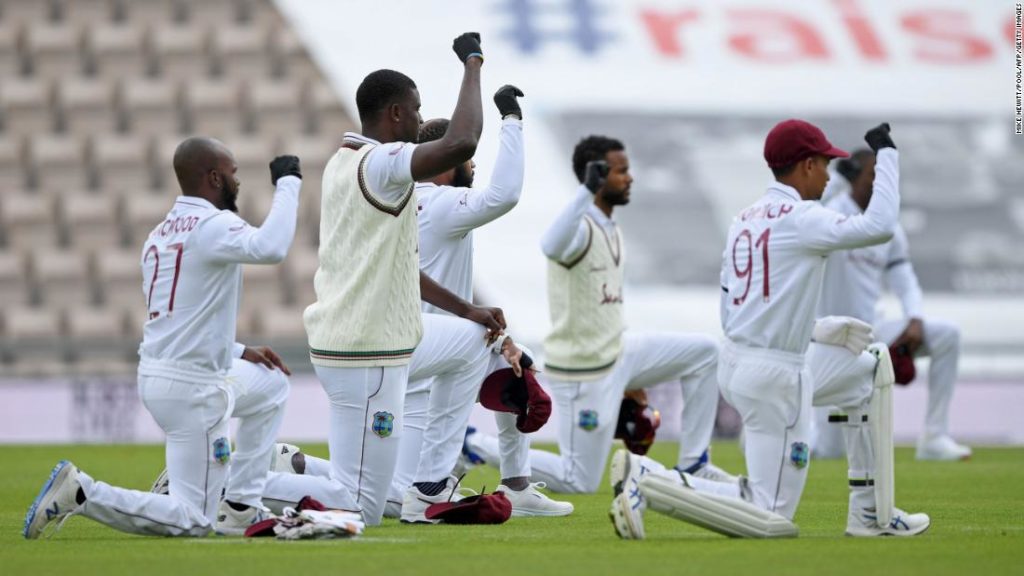Editor of the Wisden Cricketers’ Almanack, Lawrence Booth, wrote in his notes for the 2021 edition of the book that the sport “lost its nerve” over time.
“It was a moment to pause, and reflect. Players past and present had already begun telling stories of prejudice; the trickle became a torrent,” Booth wrote in the 158th edition of the Wisden Cricketers’ Almanack. “The rule of thumb was simple, and brutal: if you weren’t White, you had suffered…
“For a while, cricket said and did the right things. The ECB admitted they had let things slip, and promised action… But cricket isn’t fond of radicalism (unless there is money to be made). Predictably, it lost its nerve. By the time Pakistan arrived, taking a knee had been quietly dropped, amid supposed concerns about the politicization of BLM.
“Cricket has been here before: a sympathetic ear, a pat on the shoulder, a promise that things will change. They never do, but this time they must … By not taking a knee, cricket raised a finger.
“If cricket’s response to racism is one of expedience rather than repudiation, everyone loses,” Booth added.
The Wisden Cricketers’ Almanack is a cricket reference book published annually and has been coined the “bible of cricket” before.
In it, it names five cricketers of the year, alongside its leading cricketer in the world.
England’s Ben Stokes was named leading cricketer in the world for the second year running, while Zak Crawley, Jason Holder, Mohammad Rizwan, Dominic Sibley and Darren Stevens were named cricketers of the year.
Cricket originated in the U.K. but is now immensely popular around the world, with huge fan bases in India, Pakistan, South African and the Caribbean as well as in other Commonwealth nations.
Taking action
Booth cited a couple of instances of cases of alleged racism in England, including Indian batsmen Cheteshwar Pujara revealing in 2018 that his Yorkshire teammates called him “Steve” because they found his name too difficult. Another former Yorkshire player, Azeem Rafiq, also accused the county cricket team of racism.
When approached by CNN, Yorkshire County Cricket Club said it has taken the claims “very seriously.”
“Racism has no place in our society or in our sport,” it said. “We have taken the claims made by our former player, Azeem Rafiq, very seriously and a full investigation conducted by an independent law firm began in September last year.
“This is a very important investigation to the club and to our sport, and we have committed to a full and thorough process to provide an in-depth set of recommendations which we will publish in the coming weeks.”
As well as bursaries to increase diversity among coaches and a “re-evaluation of the way in which ECB attracts, develops and performance manages its match officials”, it says it will work alongside the Professional Cricketers’ Association to roll out an anti-racism program which “raises awareness of cultural differences and unconscious bias specifically in the context of racism in professional cricket, and address issues such as workplace banter and inappropriate non-verbal behavior.”
“The new Anti-Discrimination Code of Conduct sends a clear message that any discriminatory behavior will be dealt with through disciplinary processes and sanctions. Over the coming months we will build on the actions already taken to launch a number of new initiatives that will help us in our next step towards making cricket a truly inclusive and diverse sport.”
You may also like
-
Super League: UEFA forced to drop disciplinary proceedings against remaining clubs
-
Simone Biles says she ‘should have quit way before Tokyo’
-
Kyrie Irving: NBA star the latest to withhold vaccination status
-
Roger Hunt: English football mourns death of Liverpool striker and World Cup winner
-
‘Every single time I lift the bar, I’m just lifting my country up’: Shiva Karout’s quest for powerlifting glory

